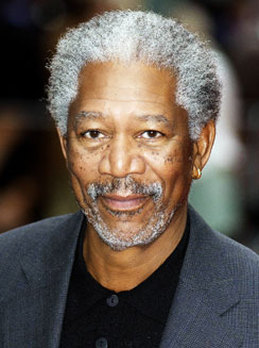 The ubiquitous Morgan Freeman Spokesmen and/or women… you know, those people who become the commercial face and voice for faceless, impersonal corporations. You’ve seen them on TV and heard them over the radio: the reassuring Dennis Haybert for Allstate Insurance; the cocky William Shatner for Priceline; Mike Rowe for Ford; Morgan Freeman for just about everybody else. (Apparently he's #5 on the list of the Top Ten Most Trusted Celebrities. And happy to do voiceovers. Nice work if you can get it!)  Hopeiary vs. Olympic fencer Well, Dow, the chemical conglomerate, has got a new spokesman with neither a face nor a voice. In fact, it’s a bit of shrubbery. Hopeiary (yes, that's what it's called - ugh!) is a giant green biped made of hedges, created by the ad agency Draftfcb in Chicago. (Perhaps the admen are Monty Python fans?) Hopeiary even has his/its own website! (Is he/it planning on being the most interesting shrub in the world?) If you’ve watched even a tidbit of the Olympics, you’ve probably seen a commercial with this anthropomorphic topiary, walking around London, stumbling into Olympic athletes. Apparently he symbolizes the planet with "its own Olympic dream"—which is to not get totally, irreparably wrecked by humans. Dow's environmental history as a global corporate citizen is checkered at best, including its links with the horrendous gas leak at a pesticide factory in Bhopal, India, 28 years ago, which killed almost 3,800 people. (It bought out Union Carbide, which owned the factory at the time.) So Hopeiary seems like more than a bit of greenwashing to me…
1 Comment
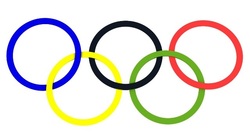 If a Martian landed on Earth and watched the Summer Olympics on prime-time television, it would probably conclude that the games consist of a handful of sports: swimming, gymnastics, diving, soccer, basketball and track-and-field events. In reality, the London 2012 Olympics will feature 26 sports in 302 medal events. Since the inaugural of the Modern Olympics in 1896, sports have been dropped and added as popularity and/or feasibility waxes and wanes. Here's a look at a few of those obscure or obsolete sports, which may leave you scratching your head and muttering, "What were they thinking?" 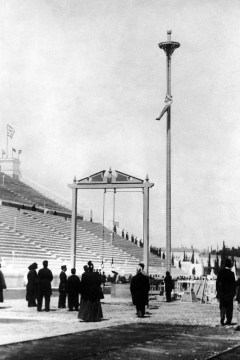 (Courtesy: Olympic.org) The Rope Climb Shades of a 1960's era gym class! Shinnying up a rope was once an Olympic event! Rope Climbing was included in the gymnastics program from 1896 through 1932. Competitors were required to ascend a suspended vertical rope, using only their hands. They started from a seated position on the floor and were timed. (Apparently in the 1896 event, style points were also awarded.) In 1896, the rope was 14 meters long (almost 46 feet!!!). Only two men, both Greek athletes, made it to the top. For future events, they lopped off about half the rope! And as all who suffer from a distinct lack of upper body strength sigh in relief, the powers-that-be (the IOC) dropped the rope after 1932. Unfortunately, sadistic gym teachers around the world kept the activity to torture their students throughout elementary and high school. 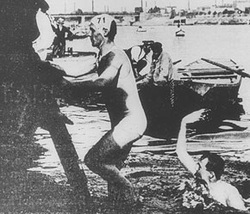 (Courtesy: Olympic.org) Swimming Obstacle Race This one-time-only event was held in 1900 at the Paris Summer Games, but I am guessing that it might be ripe for a revival and a return to the Olympic roster, given the popularity of such TV shows as "American Ninja Warrior" and "The Amazing Race," which feature all sorts of crazy obstacle course challenges. Could become a new fan favorite! As a combination swimming event/obstacle course, the competitors had to climb over a pole, then clamber over a row of boats, and then swim under another row of boats (total distance 200 meters). Since this event was held outdoors in the River Seine, the competitors also had to contend with the current. Might be a way for Michael Phelps to continue competing into his thirties... 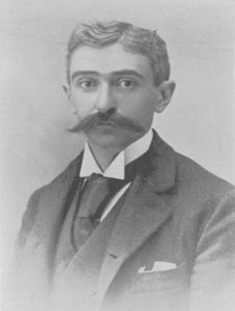 Pierre de Coubertin, sports fan and poet Art I kid you not. From 1912 to 1948, the Olympics included competitions in the artistic categories of architecture, literature, music, painting, and sculpture. In fact, the "father of the Modern Olympic movement," Pierre de Coubertin, founder of the International Olympic Committee, won a gold medal in literature for his poem "Ode Au Sport" in 1912. I know what you're thinking: they gave it to him because he was the boss. Actually, he submitted the entry under a pseudonym. Of course, when he won, he had to present the gold medal to himself. Scandalous! 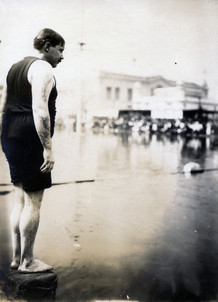 W.E. Dickey, gold medalist, 1904 plunge Plunge for Distance When we were kids, we used to call this "Dead Man's Float." You know, you dive in the pool and then see how far you can travel underwater without using your hands or feet to help propel your body. The one who gets the farthest before his head surfaces wins. This event was only held once at the Olympics, in Paris 1904. I wonder why... (Photo courtesy of Missouri History Museum) 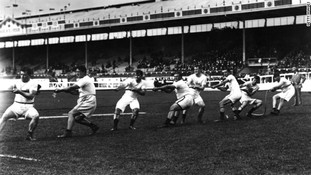 (Courtesy: Olympic.org) Tug-of-War (Not to be confused with T.E.G.W.A.R., the notorious card game from Mark Harris' novel Bang The Drum Slowly) Yes, another children's game was a sanctioned Olympic Summer Games event from 1900 through 1920. Tug-of-war was part of the track & field events. Perhaps it was included as an homage to the Ancient Olympics of Greece, where it was a highly anticipated contest. In the modern Olympics, the tug-of-war event pitted two teams of eight contestants. In order to be victorious, one team had to pull the other six feet in order to win. If after 5 minutes no team had achieved this, the team which had pulled the greatest distance was declared the winner. Intern George, on the ground in London, reports that the London 2012 Oympics have added a third mascot, who joins the original one-eyed twins, Wenlock and Mandeville. Mike Wazowski, co-star of the film Monsters Inc., has reportedly been brushing up on his British accent for the event.
 I ate up the Olympic Games when I was a child, Winter and Summer. I was glued to ABC, entranced by genial host Jim ("the thrill of victory and the agony of defeat") McKay, who also hosted "Wide World of Sports" ("spanning the globe to bring you the constant variety of sport"). I was fascinated by the foreign locales and host cities. I was thrilled by the displays of grace and strength in exotic sports of which I could only dream. In fact, I remember a writing assignment in 2nd grade in which I kept a journal, complete with illustrations, written under the persona of an Olympic downhill skier. Nevermind that I had never skied in my short life, (and still haven't) flatlander Chicagoan that I was, bred and born! I was enthralled by the dashing French skier Jean-Claude Killy and his trio of medals in the Alpine events in the 1968 Winter Olympics held at Grenoble, France. (I confess that I think I still have that relic of my childhood education tucked away in a trunk in the basement.) Of course, back in the day, both the winter and summer games were held in the same year and thus came around only once every four years, so it seemed like even more of an event. Now, with the staggered schedule, there is less of an Olympic drought in between. Perhaps that is why I am a little more blasé about them as an adult, although yes, I still watch my fill. The 2012 London Summer Olympics begin in one week, so there's still plenty of time to do a little preliminary reading and research on this mega-event which celebrates the heights of athleticism throughout the world. How about starting with a little historical perspective? 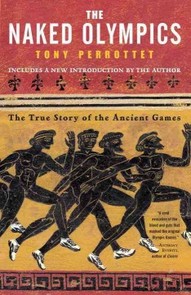 The Naked Olympics: the true story of the ancient games (Random House: 2004) Tony Perrottet A history of the original Olympic games depicts the events of the first competitions more than 2000 years ago, during which tens of thousands of sweltering-hot spectators watched nude athletes participate in such events as hoplitodromia, a full-armor sprint, and the pankration, a no-holds-barred lethal brawl. Travel writer Perrottet treats readers not only to a thorough picture of the games' proceedings but also to glimpses of the shameless bacchanalia, numerous (and often lascivious) entertainments and even corruption that accompanied them. Hmm, sounds like not a whole lot has changed...except the sporting goods companies like Nike and Reebok would never let their endorser-athletes complete sans apparel. How would they show off the swoosh? Perhaps a well-placed tattoo? 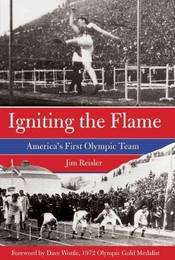 History of a more recent vintage... Igniting the Flame: America's First Olympic Team (Lyons Press, 2012) Jim Reisler The author tells the little-known story of the first modern Olympics, the 1896 Summer Olympics, highlighting the difficulties faced by a fourteen-member American team which had virtually no support heading into the games, held in Athens, Greece. Here's one remarkable anecdote among many: an American Olympian shows up for the discus event, having never really tried it before; some accommodating Greek athletes offer to demonstrate, he practice a bit and winds up winning. Reisler skillfully weaves his story from several narrative threads: the resurrection of the Olympic Games, and the men behind their revival; the primitive means of travel and lodging (no fancy Olympic Village here with 24/7 food courts); and the stories of individual athletes and events. 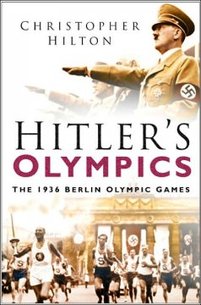 Hitler's Olympics: the 1936 Berlin Olympic Games (Sutton: 2006) Christopher Hilton The Berlin Olympic Games, which remain the most controversial ever held, will have their 80th anniversary in August 2016. Using newspapers, diaries and interviews to recreate the atmosphere during the XIth Olympiad, the author presents an account of the disputes, the personalities and the events which made these Games so memorable. Hitler, of course, used the Games as one of the largest propaganda exercises in history. African-American Jesse Owens won four gold medals in a shining moment for America. 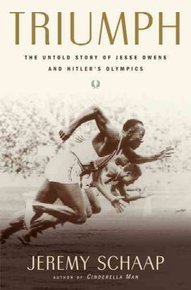 A suitable companion or alternative to the above might be... Triumph: the untold story of Jesse Owens and Hitler's Olympics (Houghton Mifflin: 2007) Jeremy Schaap Schaap (an ESPN host) touches briefly on Owens's life before and after 1936, including his Alabama childhood and his later work for the State of Illinois, focusing most of the book on Owens's track and field heroics. Blessed with amazing speed, he set NCAA records in numerous events. With the help of high-school mentor Charles Riley and college coach Larry Snyder, Owens qualified for the Olympics. After a debate about whether participation in the Nazi Games was ethical—a discussion that had special meaning for African-Americans, whose circumstances were indeed similar to those faced by German Jews—the U.S. elected to compete, setting the stage for Owens to show the world a true superman not descended from Aryan stock. 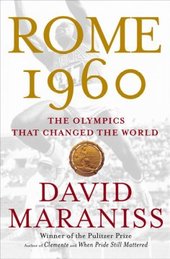 Rome 1960: the Olympics that changed the world (Simon & Schuster: 2008) David Maraniss Whether you prefer sports, politics, or history, the author has you covered in this engaging study of the first commercially televised Summer Games. There were several other firsts in Rome: the first doping scandal, the first athlete paid to wear a certain brand, the first African-American to carry the U.S. flag in the opening ceremonies. The games fed Cold War propaganda as the Soviet Union surpassed the U.S. in the medal tally. Maraniss loads his narrative with human interest stories (the barefoot Ethiopian Abebe Bikila), personal rivalries, judging squabbles, come-from-behind victories and inspirational stories of obstacles overcome (American track star Wilma Rudolph). It might not be true that these Olympics changed the world, but they definitely showcased the changing world of that era. A gold medal to anyone who finishes all five before the Summer Games begin!
|
AuthorTo find out more about me, click on the Not Your Average Jo tab. Archives
February 2024
Categories
All
|
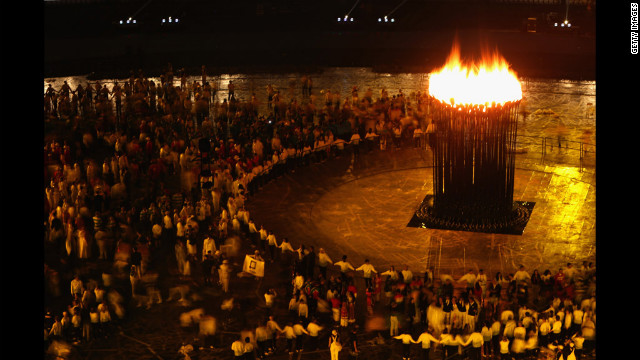
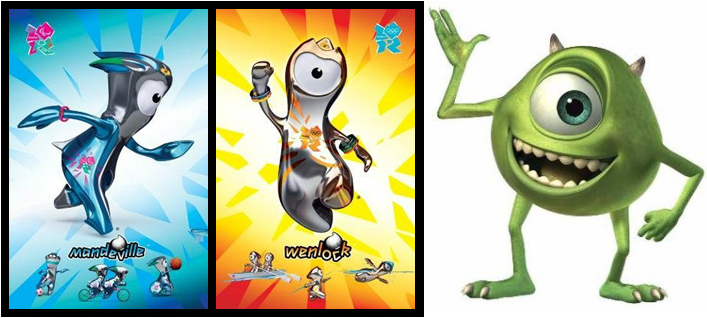
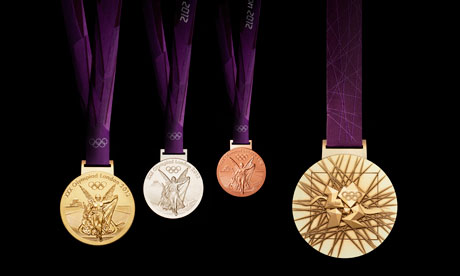
 RSS Feed
RSS Feed